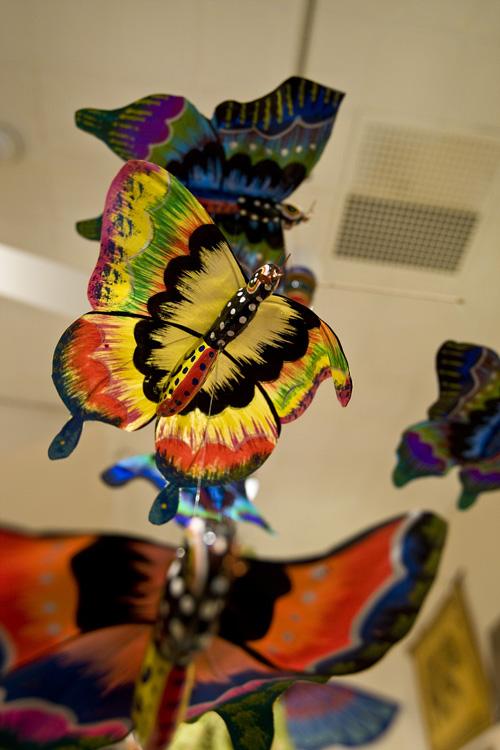Shop features fairly traded global goods
Feb 28, 2008
“I’ve been saving my pennies for this – I just love it,” said Gloria Severin, doting over the object of her desire: an ornate jade tea set, swimming with intricate hand-painted guppies. In our consumer culture, Saturdays spent treasure hunting are standard, but browsing among the ceramic masterpieces at Ten Thousand Villages is nothing like your average trip to the mall.
Global beats pulsate racks of hammered-steel Haitian wall decor above bright stacks of masterly woven Filipino baskets in the downtown Champaign boutique. All goods are handcrafted by skilled Third World laborers who turn out cultural artwork as a livelihood.
Ten Thousand Villages, 105 N. Walnut, Champaign, is a North American chain that provides an income to more than 65,000 artisans. Their goods are sold at fair trade prices, explained Community Outreach Coordinator Ruth Mininger.
“Our number one criterion is to work with those that would otherwise be unemployed or underemployed. It’s really working with the poorest of the poor,” Mininger said.
Fair trade policy means prices are set at a living wage. Earnings cover not only the artisan’s labor and materials, but food for their table, education for their children and improvements to their homes.
Get The Daily Illini in your inbox!
In order to increase the global impact, Ten Thousand Villages operates with a bare bones approach. Full-time staff includes only three managers. The organization relies on a team of volunteers to unload deliveries of batik tapestries and shimmering beaded scarves.
“We need volunteers to keep our overhead low. We are non-profit, so paying staff would mean less money to help artisans,” Mininger said.
Christine Goscha serves on the shop’s board of directors, in addition to ringing up tribal statues and dainty shell dishes carefully carved by workers in the Third World.
“To know that I can physically do something here in Champaign that makes a difference in the life of a child in Vietnam or Bangladesh is awesome,” Goscha said.
Giving sustainable employment to a single artisan often impacts an entire community in developing nations. Individuals are encouraged to join cooperatives to facilitate trade with Ten Thousand Villages. Mininger said cooperatives often have additional benefits to the worker such as financial and savings help, investment education or health care.
“When we commit to a group, we give them influence on design. Ten Thousand Villages representatives are watching trends and communicating with them on what tools and skills could be used to develop products that will sell here,” said Mininger, whose ears were adorned with trendy drops of ginger stones, a Ten Thousand Villages design from Kenya.
Cheryl Kallal, senior in ACES, browses the distinctive fare of Ten Thousand Villages regularly.
“I love that everything here is handmade and unique, not some five dollar thing made in China,” she said, gazing up at the ornate wind chimes dangling from the ceiling.
Mininger said most students seem reluctant to venture off campus to the doorstep of Ten Thousand Villages.
“I think there is often a perception of downtown as far from campus, but really we are so close to Illinois Terminal that it’s very nearby. It’s probably even easier to get here by bus than it is to drive,” she said.
Goscha echoed her sentiments: “I encourage people to come in and get acquainted,” she said, adding that sharing time as a volunteer was especially valuable.
Currently 55 generous individuals commit twice a month for four hour shifts.
“We are always looking for new volunteers,” Mininger said. She said their base is transient so new helpers are trained several times a year to keep the store running Monday through Saturday from 10 a.m. to 5:30 p.m., and Friday until 8:30 p.m.
Jan Sabey’s interest in Ten Thousand Villages was piqued when she was presented with a gift from the store. Now she volunteers and shops there regularly. Saturday morning she found a Mancala game set, hand carved and patterned with paintings by an Indonesian artisan.
“I love that it’s a multicultural cause that directly profits men and women of other countries,” she said.






